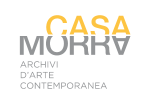Casa Morra
2° anno – 2017 – I Giganti dell’Arte dal Teatro – LIVING THEATRE
Parallelamente all’apertura del secondo anno di mostre, Casa Morra inaugura l’Archivio Living Theatre insieme ad alcune sale dedicate a Julian Beck. Pittore dal 1944 al 1954, dall’onda dell’espressionismo astratto giunge al teatro anarchico e di strada fondando nel 1947 a New York, insieme a Judith Malina, la compagnia teatrale che con più forza ha marcato l’identità del teatro della seconda metà del Novecento.
L’Archivio Living Theatre di Casa Morra contiene testi, documenti, appunti e corrispondenze, scritti personali di Judith Malina, fotografie e diapositive, manifesti, inviti, giornali, libri, riviste e registrazioni video, relativi agli anni 1969-2015, oltre a un’ampia sezione dedicata a costumi e oggetti di scena; un archivio costruito nel tempo dall’amicizia di Giuseppe Morra con Judith Malina e Hanon Reznikov.
“La vicenda artistica di Beck e della Malina è caratterizzata, fin dall’inizio, proprio da interessi diversificati e molteplici che toccano tutte le arti in un gioco libero e creativo. Il Living di quegli anni comincia a sperimentare cosa il teatro può essere, e soprattutto diventare, se non si limita negli spazi angusti della drammaturgia e della messa in scena, se, cioè, accetta di dilatare le sue potenzialità espressive, andando ad incontrare le arti della visione e la poesia. Il che non significa aspirare ad una contaminazione sul piano formale né tornare sul tema della sintesi delle arti, che pure è un riferimento che Beck, formatosi alla scuola del Modernismo, ha ben presente. Si tratta piuttosto, fin dall’inizio – ma, in seguito questo elemento sarà ancora più evidente – di delineare un gioco di contaminazioni, di migrazioni, di stupori del linguaggio al contatto con mondi e sistemi linguistici diversi. Il che significa che ciò che interessa il Living non è tanto incontrare le arti su di un piano formale od intellettuale ma, anzitutto, cercare un contatto sul piano umano, fare dell’arte, e del teatro, il motivo e la ragione di un incontro.” Tratto da L. Mango, Una “casa vivente”
—
In parallel to the opening of the second year of exhibitions, Casa Morra opens the Living Theatre Archive alongside rooms devoted to Julian Beck. He specialised in abstract expressionist painting from 1944 to 1954, but his interest then shifted towards anarchic and street theatre. With Judith Malina, he founded in New York the theatre company that would have the most decisive influence on the identity of theatre in the second half of the 20th century.
The Living Theatre Archive at Casa Morra houses texts, documents, notes, and correspondence, as well as Judith Malina’s personal writings, photographs, and slides. It is also home to posters, invitations, newspapers, books, magazines, and video recordings relating to the period from 1969 to 2015, in addition to a large section devoted to costumes and props. The archive has grown over the years thanks to Giuseppe Morra’s friendship with Judith Malina and Hanon Reznikov.
“From the very beginning, Beck and Malina’s artistic career was marked by their rich and varied interests, freely spanning the gamut of the arts. During those years, the Living Theatre began to experiment with what theatre can be, and above all become, if it overcomes the constraints of the narrow spaces of dramaturgy and staging and is willing to expand its expressive potential and meet the arts of vision and poetry. This does not mean aspiring to formal contamination, nor a return to the theme of the synthesis of the arts, which is a reference that Beck, trained in the school of Modernism, knew well. Instead, and right from the outset, this would become even more evident in time, mapping out a play of contaminations, migrations, and astonishing language across diverse worlds and language systems. Thus, what interested the Living Theatre was not so much a formal or intellection encounter with the arts but, above all, to seek contact on a human level, to make art, and theatre, the reason and motive for an encounter”. Taken from L. Mango, Una “casa vivente”.
